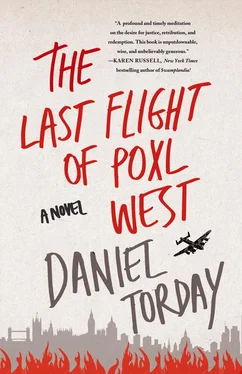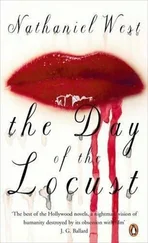My mother took note of my presence. She blanched. Her shoulders drew back. A look crossed her face.
“I suppose I’m glad to see you like them,” my mother said. “They’re the work of a great painter, an Austrian called Schiele.”
I looked away from the first painting and to one of an emaciated, naked older woman who appeared to be writhing in pain. My mother pushed it off to the side to reveal a portrait of a similarly angular woman with her legs spread as if to form a wishbone, between them heavy brushstrokes of dark gnarly brown. My mother explained that she had posed for Schiele when she was young, during summers she spent in Neulenbach, outside Vienna. There she would go to his atelier to see him with his woman, Wallie. She took my mother to buy beautiful hats until Schiele was sent to prison.
But I could not listen to her words — for on the face of the second Schiele girl, I saw something fantastic, something I hadn’t noticed in the midst of my preoccupation with the fact that certain deep brushstrokes had been used to create the deep pink roundness of the areolae on that girl.
The face in that second painting was very young. But it was clearly my mother’s.
If that realization wasn’t enough, these paintings were the exact images overlaid by cobblestones that I’d seen when I’d closed my eyes in the bathroom minutes earlier.
I blinked hard.
It was as if I had crafted Schiele’s style in my mind just minutes before. While I marveled at this coincidence, my mother said that before her marriage to my father was arranged she had sat for “her Egon” when Wallie was away. She had been the subject of a number of his paintings. Grandmother Traute had tracked down the others some time later, wishing them to be kept private.
“So what do you think, Poxl?” she said.
Again that look crossed her face.
“Let the boy to his tea,” Grandmother Traute said. She had arrived in the doorway — when I couldn’t say. “He hasn’t had a thing to eat.”
My grandmother sent me off to my tea. Voices rose from the other room and then cut out altogether. Something passed between my mother and grandmother. They returned to the drawing room. We ate. Mother sent me off for our coats and I heard corrugated words pass between them yet again. Soon we left without my learning what had transpired.
Then we were going home to Leitmeritz. My father planned to stay on another night in Prague to steal skyward one more day in his new plane. It struck me only later just how often one or the other of my parents was in Prague alone, each taking trips south almost weekly. Though in the years to follow I would learn from my father how to handle those small propeller planes that prepared me for the Tiger Moths I would later train on, my mother and I now rode the train home alone.
“Now that I know what you thought of the Schieles,” she said, “tell me. Would you want to try your hand at painting one day?”
I’d only ever shown interest in books, and in my father’s leather. The latter was the only viable option for me. The former could survive in mind only as a potential avocation.
“I’ll take over Brüder Weisberg one day,” I said.
“Well, yes, but you could paint on the side.”
“If I was going to do anything,” I said, “I’d write, or at the least study books, I suppose.”
Her eyes grew gray. I did not know a thing about painting, but I knew my mother well enough to see I’d disappointed her.
I tried to say I could show her some of my writing if she wanted. But her eyes only darkened. She was staring out at the fallow fields alongside our window. Stands of sunflowers grew diffuse in the thickening evening light.
“Your grandmother felt very strongly against my having posed for Schiele when I was a girl,” my mother said. She continued to stare out the window as she spoke. “I was just the age when a woman is supposed to have her marriage arranged. My parents decided your father was the man for me. His family still lived in Prague then. They were a good family. This was before the riots, just before you were born, before we moved to Leitmeritz for good. But that summer I lived in Neulenbach and Egon—” She stopped for a second. Not looking at me, she started up again. “The painter Schiele, whose work I’ve introduced you to showed me how to paint. He suffered for his art. He was jailed after everyone in town complained he was corrupting their — that he should not be painting the portraits as he was painting them. It was only after his death that Vater would even let us keep his paintings in our house. Then Grandmother Traute became obsessed with tracking them all down, owning them.”
Again she stopped and looked out the window.
We both stopped talking. My mother went to sleep. She was a small woman with the curly rust-red hair a minority of Ashkenazi Jews are blessed with. A pair of earrings dangled from her lobes, each with a piece of amber the size of a child’s shooting marble. I put my head against her clavicle as I always had when I was a child. In her half-sleep, she pulled me to her, then took the amber from her ears. She clacked them against each other in her left hand. Only when the knocking of amber quieted did I know she’d passed fully into sleep.
I put my finger to her ear as I had when I was a child, as I would never stop longing to do. She lay against the door, stilled, sedentary, a woman frozen, having been captured in paint and only half-released back to the world moving past her. Her earlobe grown soft, ceding to the amber’s pull, drooping, awaiting the next trip to Prague.
2.
My name has appeared as pilot at the top of more flight manifests than I could possibly count. But you will not find a written record of the most memorable time I rose skyward. It was little more than a year after that trip to Prague with my mother. After many years left standing in a field at the aero club my father belonged to, watching him fly off and waiting for minutes, hours, until his plane appeared again in the sky — he a distant cloud obscuring the sun as I waited below — when I turned fifteen we drove down together to fly in his new Bene�-Mrāz Be-50 monoplane. Business must have been going well, a real fortune accruing, for this was the first plane he owned outright. For weeks prior, my father had quizzed me on flight safety, and I had complied. And now here we were.
There was an overcast sky that early-spring morning. We’d left Leitmeritz before the sun rose above Radobyl and spoken little in the morning haze coming down, and we were alone at the aero club when we arrived. My father liked very much to teach me about the leather business, but there was a newfound energy in him that morning — one I’d observed many times before and now could finally share for the first time. In the small hangar I was overcome by the smell of petrol filling the air. As my father went about his work, prepping the parts of the wooden wings of his new plane, we talked with a freedom I rarely experienced with him. His hands were busy, and when your hands are busy, it liberates your voice.
“Do you like the books you’re studying at the gymnasium, Leopold?” he said. Only my father called me by my full name. Everyone else just called me Poxl. “Your mother tells me you long to study books. Perhaps you’ll be a writer.”
“I didn’t tell her that,” I said. “I want to take over the business. But I told her that if I were not to take over the business, I’d be more interested in books than I would in painting.”
His hands stopped moving along the wood of the ailerons he’d been working on. I watched him make twin fists, knuckles pink against white skin, and then release them. Then he began again at his work.
“Yes, your mother and painting,” he said. “Very hard to get her off that topic once she’s begun.”
Читать дальше












